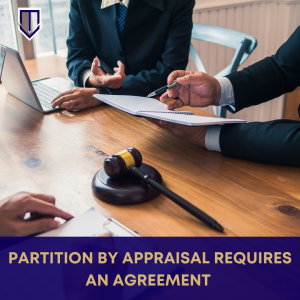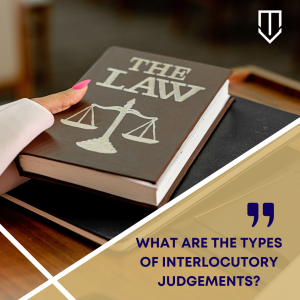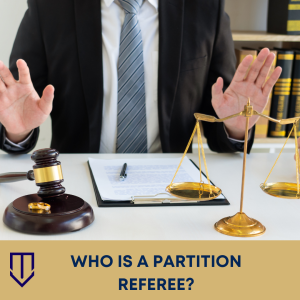 A partition by appraisal is an alternative method of partition that occurs when the parties to a partition action agree to have the subject property partitioned by appraisal. With the Partition of Real Property Act taking effect in 2023, almost every partition action moving forward will involve a Partition by Appraisal. As such, the rules for a partition by appraisal will be important to know for everyone involved in such an action.
A partition by appraisal is an alternative method of partition that occurs when the parties to a partition action agree to have the subject property partitioned by appraisal. With the Partition of Real Property Act taking effect in 2023, almost every partition action moving forward will involve a Partition by Appraisal. As such, the rules for a partition by appraisal will be important to know for everyone involved in such an action.
Once a partition by appraisal commences, the parties must then go through the appraisal process with an independent appraiser. An independent appraiser appraises the subject property, and the judgment of the appraiser determines the value that should be paid to buy out the interest of the selling co-owner. At the Underwood Law Firm, our attorneys are more than familiar with partition actions and the requirements needed to pursue a partition by appraisal.
 California Partition Law Blog
California Partition Law Blog


 “Joint tenancy” is a phrase that most people associate with the co-ownership of a property. And indeed, this is correct. Joint tenancy is a form of co-ownership in California, second only to
“Joint tenancy” is a phrase that most people associate with the co-ownership of a property. And indeed, this is correct. Joint tenancy is a form of co-ownership in California, second only to In California, in many
In California, in many  Even when a party finally secures a judgment of partition, the property itself must still be sold (or partitioned in another way). This raises a brand-new set of issues for litigants as they attempt to figure out the terms of sale, when the property should be sold, and, most importantly, the asking price.
Even when a party finally secures a judgment of partition, the property itself must still be sold (or partitioned in another way). This raises a brand-new set of issues for litigants as they attempt to figure out the terms of sale, when the property should be sold, and, most importantly, the asking price. In California, business enterprises can take many forms (LLCs, corporations, partnerships, etc.). But perhaps the most unique is the “joint venture,” a special entity that, more often than not, is
In California, business enterprises can take many forms (LLCs, corporations, partnerships, etc.). But perhaps the most unique is the “joint venture,” a special entity that, more often than not, is  The deed to a property is the most important document a property owner has. It describes the title and its associated rights while operating as the conveyance of property itself. For that reason, the law presumes the validity of deeds without defects on their face. But that does not mean that every deed is legally valid and not subject to cancellation.
The deed to a property is the most important document a property owner has. It describes the title and its associated rights while operating as the conveyance of property itself. For that reason, the law presumes the validity of deeds without defects on their face. But that does not mean that every deed is legally valid and not subject to cancellation. In most partition actions, the court appoints a partition referee in order to see that the property is sold or properly divided. The job of a Partition referee requires one to carry out several responsibilities and obligations. The purpose of this article is to provide some information on a partition referee’s duties and authority under the partition statutes.
In most partition actions, the court appoints a partition referee in order to see that the property is sold or properly divided. The job of a Partition referee requires one to carry out several responsibilities and obligations. The purpose of this article is to provide some information on a partition referee’s duties and authority under the partition statutes.  Partitions by appraisal are a unique way to resolve a
Partitions by appraisal are a unique way to resolve a  Sir William Blackstone is a titan in the field of legal jurisprudence. His 1765 work, Commentaries on the Laws of England, is his most famous legal treatise, forming the backbone of common law analysis as modern lawyers understand it today. Without his efforts centuries ago, our conceptions of property, individual rights, and governmental authority would not be the same. His works remain cited even now in judicial decisions at all levels, including the Supreme Court of the United States.
Sir William Blackstone is a titan in the field of legal jurisprudence. His 1765 work, Commentaries on the Laws of England, is his most famous legal treatise, forming the backbone of common law analysis as modern lawyers understand it today. Without his efforts centuries ago, our conceptions of property, individual rights, and governmental authority would not be the same. His works remain cited even now in judicial decisions at all levels, including the Supreme Court of the United States. A lis pendens – also called a notice of pendency of action – is a special type of legal document filed with a county recorder. Though its use is limited to lawsuits involving real property claims, its effect is powerful. Once recorded, it acts as “constructive notice” to all persons who would subsequently acquire an interest in the property at issue that a lawsuit is occurring.
A lis pendens – also called a notice of pendency of action – is a special type of legal document filed with a county recorder. Though its use is limited to lawsuits involving real property claims, its effect is powerful. Once recorded, it acts as “constructive notice” to all persons who would subsequently acquire an interest in the property at issue that a lawsuit is occurring.